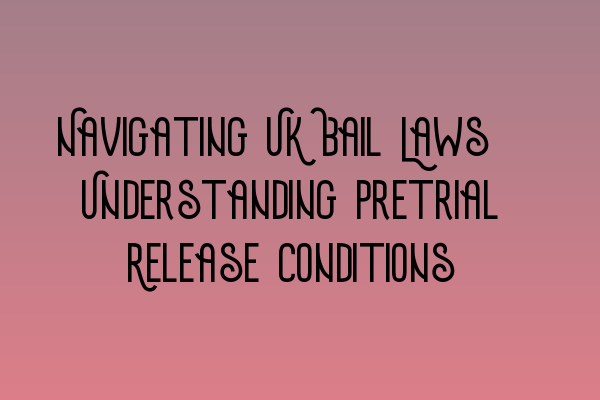Navigating UK Bail Laws: Understanding Pretrial Release Conditions
When it comes to the UK legal system, understanding bail laws is crucial for both solicitors and defendants. Bail allows a defendant to be released from custody while awaiting trial, but it is subject to specific conditions. In this article, we will explore the concept of bail, the different types of pretrial release conditions, and the factors that influence whether bail will be granted or not.
What is Bail?
Bail is the temporary release of an accused person who is awaiting trial. It ensures the defendant’s presence in court and allows them to prepare for their case outside of custody. However, bail is not without its conditions.
There are various types of pretrial release conditions that may be imposed on a defendant. These conditions aim to minimize the risk of flight, prevent interference with witnesses or evidence, and protect the safety of the public. Some common conditions include:
- Residential Address: The defendant may be required to provide a valid residential address where they will reside while on bail.
- Reporting: The defendant may be required to report to a specified police station or probation officer at regular intervals.
- Curfew: The defendant may be subject to a curfew, which restricts their movement during specific hours of the day.
- Surety: A surety, often in the form of a monetary bond, may be required to guarantee the defendant’s appearance in court.
These conditions can vary depending on the severity of the crime, the defendant’s criminal history, and the risk they pose to the community.
Factors Affecting Bail Decisions
When considering whether to grant bail, the court takes several factors into account. These factors include:
- Flight Risk: The court examines whether the defendant is likely to abscond or fail to appear in court if released on bail.
- Likelihood of Reoffending: The court considers the defendant’s prior criminal record and assesses the risk of them committing further offenses if released.
- Public Safety: The court evaluates whether there is a risk to the safety of the public if the defendant is granted bail.
- Witness Interference: The court assesses the likelihood of the defendant interfering with witnesses or tampering with evidence if released on bail.
These factors play a vital role in determining whether bail will be granted, denied, or whether additional conditions will be imposed.
Understanding the Complexities of UK Bail Laws
Navigating the intricacies of UK bail laws can be challenging. That’s why solicitors specializing in criminal law play a crucial role in advising their clients on bail matters. By ensuring that their clients understand the bail conditions and comply with them, solicitors can help secure their clients’ pretrial release and support their defense strategy.
To succeed in the field of criminal law and effectively navigate the UK bail system, aspiring solicitors need thorough preparation and knowledge. The SQE 1 Practice Exam Questions and SQE 1 Practice Mocks FLK1 FLK2 articles can serve as valuable resources for solicitors preparing for the Solicitors Qualifying Examination (SQE) Part 1.
Additionally, to enhance their understanding of criminal law and prepare for the SQE Part 2, solicitors can benefit from comprehensive SQE 2 Preparation Courses. These courses cover various areas of criminal law, including bail laws, and provide practical training to ensure solicitors are well-equipped to serve their clients.
In Summary
Understanding UK bail laws is crucial for both solicitors and defendants. Bail allows defendants to be released from custody while awaiting trial, but it comes with specific conditions. Factors such as flight risk, likelihood of reoffending, public safety, and witness interference influence the court’s decision on bail.
If you are seeking to excel in the field of criminal law and navigate UK bail laws effectively, preparation and knowledge are key. Utilize the resources mentioned in this article, such as the SQE 1 Preparation Courses and SRA SQE Exam Dates, to enhance your understanding and boost your chances of success.
